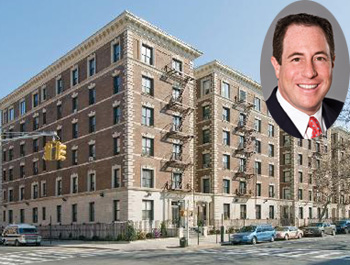
Steve Kliegerman, executive director of development marketing at Halstead Property, and Central Park Plaza at 1851 Adam Clayton Powell Boulevard in Harlem, which just gained FHA approval today
A temporary move to ease lending standards by the Federal Housing Administration has fueled hopes of a turnaround in New York’s residential housing market, as condominium developers have struggled to get financing for new buyers and fill thousands of unsold units.
Earlier this month, the agency announced that starting Dec. 7, it will lower the FHA pre-sale requirements for new condo buildings to 30 percent from 50 percent. In addition, the FHA will guarantee loans for 50 percent of a condo building’s units if the project meets strict underwriting standards.
“It completely changes the face of the New York City real estate market,” said Gary Goldman, president of National Condo Advisors, a Westchester-based firm that helps developers qualify for end-loan financing. “Now all these new construction buildings have a shot at getting some units closed.”
As the nation’s leading insurer of home mortgages, the FHA ruling is significant in two ways for the New York market, according to local real estate experts. Hundreds of condo projects around the city cannot qualify their buyers for Fannie Mae-approved loans because of that agency’s strict pre-sale requirements of 50 to 70 percent. FHA will also insure loans with low down payments and less-than-perfect credit scores, which means middle class condo buyers will be able to qualify for FHA loans.
“Overall it’s much easier for clients to get loans approved,” said Julie Tietel, senior vice president at Guardhill Financial, a Manhattan-based mortgage broker.
Since the new guidelines were issued Nov. 6, the U.S. Department of Housing and Urban Development has approved a number of condo projects in Harlem, Brooklyn and other parts of the city for FHA financing. According to HUD statistics, there are 318 FHA approved condos in the New York market, and a number of new developers are scrambling to qualify.
The Edge, a 575-unit luxury condominium in Williamsburg just received approval for FHA financing last week, according to Goldman.
After launching sales in April 2008, officials at the Edge say it became increasingly difficult for buyers to qualify for condo loans, as lenders tightened underwriting standards after the global financial crisis last fall.
“When we first started building the project we got pre-approvals from multiple lenders, but the lending criteria changed over time,” said Jonathan Fair, senior vice president at Douglaston Development, the sponsor of the Edge.
Experts say that FHA loans are not a panacea for the buyer or the developer, as allow buyers to finance up to 96.5 percent of their condo unit, but the maximum loan amount is $729,750, therefore the minimum down payments are often much higher.
Steve Kliegerman, executive director of development marketing at Halstead Property, noted that banks are even looking for FHA or Fannie Mae pre-approval on buildings before they will approve jumbo loans, figuring that a building that meets those rigorous standards is a safer bet for luxury apartments.
Several buildings that his firm represents have received FHA approval, including Central Park Plaza at 1851 Adam Clayton Powell Boulevard in Harlem, which just gained approval today.
Another hurdle for developers is that FHA will underwrite 100 percent of loans in some buildings, but the developer has to set aside 10 percent of the budget for the reserve fund and meet other strict requirements.
Jonathan Miller, president of Manhattan-based appraisal firm Miller Samuel, warned that the increased use of FHA loans could help stimulate the local condo market, but warned that FHA‘s market share nationwide has skyrocketed from 3 percent to 30 percent, putting the agency at an increased risk if local borrowers default.
“It may well be successful in stimulating more sales activity,” he said. “However, that comes at a price of more exposure for FHA.”